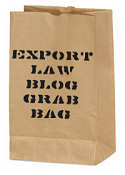![Judge Tim Wright [Credit: Williamson County][Fair Use] Judge Tim Wright [Credit: Williamson County][Fair Use]](https://www.exportlawblog.com/images/JudgeWright.jpg)
ABOVE: Judge Tim Wright
Well, it is probably safe to say that not many (if any) judges have been indicted on allegations of illegally exporting firearms. But that’s what happened to Judge Tim Wright, a judge in Williamson County, Texas, who was charged with various firearm charges, including illegal exports of firearms. There are few details in the indictment beyond alleging that Judge Williams, which the indictment rather oddly insists on calling “Timothy L. Wright, III, aka ‘The Judge,'” sold guns to a person without an export license knowing that the guns were intended for export.
This is a strangely odd locution: it alleges that Judge Wright knew that the guns were for export but does not allege that the Judge knew that the purchaser did not have an export license or that the Judge knew that his sale or the export were illegal. This probably explains why Judge Wright was charged under the Anti-Smuggling Statute, 18 U.S.C. § 554, and not under the Arms Export Control Act, 22 U.S.C. § 2278. There is well-established precedent under the Arms Export Control Act that a conviction can only be had if the defendant knew that his export was in violation of law. On the other hand, it appears hat prosecutors believe, as I have said previously, that they can establish a criminal violation of 18 U.S.C. § 554 simply by proving the defendant knew that the item was to be exported without any requirement that they prove he knew that the export was illegal.
Whether a court will send someone to jail on such a flimsy showing of criminal intent remains to be seen.

 Posted by
Posted by  Category:
Category: 

 Here are a few recent developments that you may have missed:
Here are a few recent developments that you may have missed:![Cuba - Havana - Car by Didier Baertschiger [CC-BY-SA-2.0 (http://creativecommons.org/licenses/by-sa/2.0)], via Flickr https://www.flickr.com/photos/didierbaertschiger/11785935544[cropped] Cuba - Havana - Car by Didier Baertschiger [CC-BY-SA-2.0 (http://creativecommons.org/licenses/by-sa/2.0)], via Flickr https://www.flickr.com/photos/didierbaertschiger/11785935544[cropped]](https://www.exportlawblog.com/images/cuba_car2.jpg)
![Ammo Seized by Customs via http://www.cbp.gov/newsroom/local-media-release/2015-04-07-000000/cbp-seizes-ammo-slated-export [Public Domain - Work of Federal Employee] Ammo Seized by Customs via http://www.cbp.gov/newsroom/local-media-release/2015-04-07-000000/cbp-seizes-ammo-slated-export [Public Domain - Work of Federal Employee]](https://www.exportlawblog.com/images/ammo.jpg)
![Casa Espada airbnb listing via https://www.airbnb.com/rooms/5701299?s=yz00 [Fair Use] Casa Espada airbnb listing via https://www.airbnb.com/rooms/5701299?s=yz00 [Fair Use]](https://www.exportlawblog.com/images/airbnb_havana.jpg) The revised Cuba sanctions created a
The revised Cuba sanctions created a 

